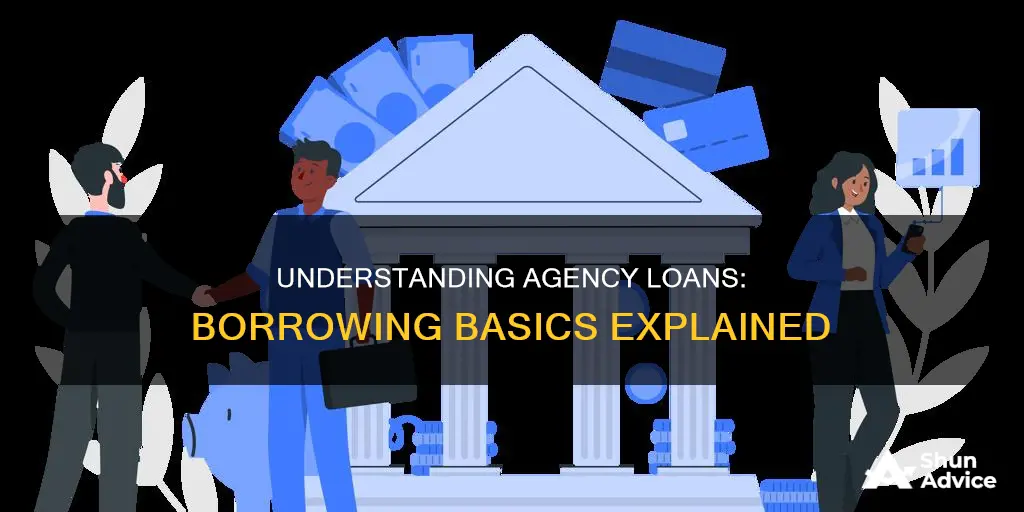
Agency loans are mortgages backed by government-sponsored enterprises (GSEs) like Fannie Mae, Freddie Mac, or Ginnie Mae. They are issued or guaranteed by government agencies, which include the Federal Housing Administration (FHA), the U.S. Department of Veterans Affairs (VA), and the U.S. Department of Agriculture (USDA). Agency loans offer favourable terms to borrowers, including lower down payments, better interest rates, and more flexible credit score requirements. They are often used for residential mortgages, but some agencies also offer loan programs for small businesses. Agency loans can be a great option for those looking to invest in multifamily properties, as they provide liquidity to mortgage lenders and enable them to offer more loans to potential homeowners.
Characteristics of Agency Loans
| Characteristics | Values |
|---|---|
| Type of Financing | Agency loans are one of the two categories of financing options available to commercial real estate investors. The other is non-agency loans. |
| Backing | Agency loans are backed by government agencies or government-sponsored enterprises (GSEs). |
| Agencies Involved | Fannie Mae, Freddie Mac, Federal Housing Administration (FHA), U.S. Department of Veterans Affairs (VA), Ginnie Mae, and U.S. Department of Agriculture (USDA). |
| Focus | Agency loans primarily focus on residential mortgages and properties. |
| Borrower Criteria | First-time homebuyers, veterans, or individuals in rural areas. |
| Interest Rates | Competitive interest rates that are typically lower than non-agency loans. |
| Loan Terms | Longer amortization options (25-30 years) and sometimes fully amortization options. |
| Down Payment | Lower down payment requirements. |
| Credit Score | More lenient credit score criteria, but a minimum FICO score of 660-680 is generally required. |
| Liquidity | Provides liquidity to mortgage lenders, enabling them to offer more loans to potential homeowners. |
| Standardization | Standardization of loan terms through underwriting standards. |
| Non-Recourse | With most agency loans, borrowers are not personally liable for the loan. |
| Assumability | If the borrower sells the property before the loan term ends, the buyer may assume the loan. |
| Flexibility | Borrowers can keep their cash deposits and property operating accounts at their bank of choice. |
| Loan Types | Variety of loan types offered, including specialized loans for affordable housing, senior living facilities, student housing, etc. |
What You'll Learn

Government-backed loans
Agency loans are mortgages backed by government-sponsored enterprises, providing favourable terms to borrowers. They are also known as government loans and are issued or guaranteed by government agencies. These agencies include the Federal Housing Administration (FHA), the U.S. Department of Veterans Affairs (VA), and the U.S. Department of Agriculture (USDA).
For organisations, government loans are typically not given for personal expenses. Instead, they are for organisations that work with programs and projects funded by the government. These are called federal government grants, and they can be found on Grants.gov or by contacting your state or territory to find funding opportunities locally.
Becoming a Loan Signing Agent: Illinois Requirements and Steps
You may want to see also

Non-agency loans
Understanding the differences between agency and non-agency loans is crucial for investors seeking to finance commercial real estate ventures. While non-agency loans offer flexibility and customization, they lack the stability and favourable terms provided by agency loans.
Understanding Cup Loans: Borrowing Basics Explained
You may want to see also

Competitive interest rates
Agency loans are mortgages backed by government-sponsored enterprises (GSEs) or government agencies, such as Fannie Mae, Freddie Mac, the Federal Housing Administration (FHA), the U.S. Department of Veterans Affairs (VA), and the U.S. Department of Agriculture (USDA). These agencies provide government backing or insurance to reduce the risk for lenders, which results in more favourable terms for borrowers, including competitive interest rates.
Agency loans typically offer competitive interest rates due to the government backing, which reduces the risk for lenders. This backing allows agencies to consistently offer lower rates to borrowers. The reduced risk also means that agencies can be more lenient with credit score criteria, making it easier for borrowers to qualify for loans. Additionally, agencies can maintain active lending during economic downturns and recessions, ensuring a continuous flow of capital and contributing to overall economic stability and growth.
The interest rates for agency loans are often locked in once the actual pools are attached to the TBAs, enabling investors to hedge other positions. These loans usually offer longer amortization options, sometimes with fully amortizing options, and may include an interest-only period during the first few years of the term. The longer amortization periods can range from 25 to 30 years, providing borrowers with more time to repay the loan.
Compared to non-agency loans, agency loans tend to have lower interest rates. Non-agency loans, provided by private lenders such as banks and credit unions, typically have higher interest rates due to the lack of government backing. However, non-agency loans may offer more flexibility in terms of loan amounts, borrower qualifications, and property types, catering to a broader range of investors and projects.
It is important to note that while agency loans offer competitive interest rates, they may also come with additional fees and mortgage insurance premiums. The specific interest rates and fees will depend on the loan-to-value ratio, the agency program, and the individual deal. Ultimately, borrowers should carefully consider their needs and financial situation when choosing between agency and non-agency loans.
Loan Modifications: Spouse Signature Requirements and Exemptions
You may want to see also

Borrower eligibility
Agency loans are mortgages backed by government-sponsored enterprises, such as Fannie Mae, Freddie Mac, the Federal Housing Administration (FHA), the U.S. Department of Veterans Affairs (VA), Ginnie Mae, and the U.S. Department of Agriculture (USDA). These agencies provide an additional layer of security for lenders, reducing their risk and allowing them to offer more favourable terms to borrowers.
- First-time homebuyers: Many agency loans are designed for first-time homebuyers, who have not owned or occupied a home in a certain number of years, typically defined as three years.
- First-generation homebuyers: Some agencies, like the CA Housing Finance Agency, offer loans to first-generation homebuyers, who have not had an ownership interest in a home in the United States in a specified period, usually seven years, and whose parents do not have any present ownership interest in a home in the country.
- Veterans: Agency loans often cater to veterans, providing them with favourable terms and conditions.
- Individuals in rural areas: Agency loans may also target individuals in rural areas, helping them access financing for residential properties.
- Income limits: Borrowers need to meet specific income requirements, which vary depending on the loan program and the agency offering the loan.
- Credit scores: Agency loans may have more lenient credit score requirements compared to non-agency loans, but they still consider the borrower's credit history and FICO scores.
- Down payment: While agency loans typically have lower down payment requirements, some programs may require a minimum down payment, such as 20% for FHA loans.
- Debt-to-income ratio: The agency will consider the borrower's debt-to-income ratio to assess their ability to repay the loan.
- Loan limits: Government agencies often set maximum loan amounts, and borrowers need to ensure their loan request falls within these limits.
- Citizenship: In some cases, citizenship status may be a factor in determining borrower eligibility for agency loans.
It is important to note that borrower eligibility criteria can vary across different agencies and loan programs. Therefore, it is essential to review the specific requirements of the relevant agency and program before applying for an agency loan.
Stafford Loans: Impact on SNAP Benefits Eligibility
You may want to see also

Loan terms
Agency loans are mortgages backed by government-sponsored enterprises or government agencies, such as Fannie Mae, Freddie Mac, the Federal Housing Administration (FHA), the U.S. Department of Veterans Affairs (VA), and the U.S. Department of Agriculture (USDA). These agencies buy mortgages from lenders and package them into mortgage-backed securities, which are then sold to investors on the secondary market. This process helps to maintain liquidity in the housing market, keeping interest rates low and making home financing more accessible.
Agency loans typically offer more favourable terms than non-agency loans, including lower down payment requirements, more lenient credit score criteria, and competitive interest rates. They also provide a consistent source of capital, with GSEs remaining active during economic downturns and recessions. The loan terms for Fannie Mae and Freddie Mac's Small Balance Program typically range from 5 to 10 years for fixed-rate loans and can be extended to 20 years with a rate reset. Floating-rate loans from these GSEs have terms between 5 and 30 years. The loan-to-value (LTV) ratio may be up to 75% with 1.25% amortization, although most agency loans are below 70% LTV.
Agency loans also offer flexibility in terms of allowing borrowers to keep their cash deposits and property operating accounts at their bank of choice. Additionally, they provide non-recourse financing, meaning borrowers are not personally liable for the loan unless there is evidence of fraud or unethical behaviour. If the borrower sells the property before the loan term ends, the buyer may assume the loan. Agency loans cater to specific borrower criteria, such as first-time homebuyers, veterans, or individuals in rural areas.
In contrast to non-agency loans, which offer greater flexibility in loan amounts, borrower qualifications, and property types, agency loans have specific eligibility requirements and focus primarily on residential properties, including multifamily investment properties. They have fixed terms, loan limits, and standardised documentation and approval processes determined by the government agency. While agency loans may have additional fees and mortgage insurance premiums, they often provide more competitive interest rates due to their government backing.
Explore Rural Opportunities with a Development Loan
You may want to see also
Frequently asked questions
Agency loans are mortgages backed by government-sponsored enterprises or government agencies like Fannie Mae, Freddie Mac, the Federal Housing Administration (FHA), the U.S. Department of Veterans Affairs (VA), and the U.S. Department of Agriculture (USDA).
Agency loans typically offer lower interest rates, lower down payments, more lenient credit score criteria, and a variety of loan term options. They also provide a consistent source of capital, regardless of the borrower's location or economic conditions.
Non-agency loans are provided by private lenders, such as banks, credit unions, and non-bank financial institutions, and are not backed by government entities. They offer greater flexibility in loan amounts, borrower qualifications, and property types, catering to a wider range of commercial real estate investors.
While agency loans offer favourable terms, borrowers should be aware of potential prepayment penalties and additional fees associated with mortgage insurance premiums. Additionally, borrowers typically need to meet certain criteria, such as having good credit, sufficient assets, and liquidity proportional to the loan amount.







